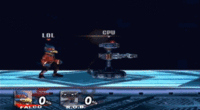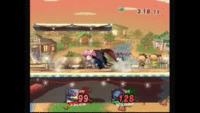Dash attack canceled up smash: Difference between revisions
| Line 33: | Line 33: | ||
==Super glide tossing== | ==Super glide tossing== | ||
In ''Brawl'' and ''Smash 4'', the inputs for a DACUS can | In ''Brawl'' and ''Smash 4'', the inputs for a DACUS can be used for some characters to super [[glide toss]] with items, and in most cases where a character can do a super glide toss and/or a [[jump cancel throw]], a super glide toss will travel more distance, though it is trumped by regular glide tosses in ''Brawl'' if the character in question can perform it. It is also somewhat limited by how it works; when performed correctly, the dash [[item throw]] is cancelled with another item throw input (which must be inputted upwards, hence the DACUS input), resulting in an upward item throw that slides the character forward. Regardless of its limitations, the technique is most useful with {{SSBB|Link}}; while he gains merely average distance with a super glide toss, he can generate [[Bomb (Link)|Bomb]]s to use it immediately (while most other special moves that generate items take a considerably longer time), and he cannot glide toss using the regular method and gains less distance with jump cancel throws. He is also one of the only characters in both games that can additionally super glide toss an item forward (should the cancel be delayed) while retaining a decent distance; the result is Link throwing an item forward while sliding forward, then waving his arm upwards as if he is throwing another item. This has the effect of shortening the dash item throw animation. | ||
Super glide tossing can also be performed with a dash throw inputted with Z and hitting the C-Stick upwards (while both are set to their default action), which enables some characters (like {{SSB4|Mega Man}}) to slide as far as possible. | |||
===In ''Smash 4''=== | ===In ''Smash 4''=== | ||
Revision as of 14:09, June 15, 2016
The dash attack canceled up smash (abbreviated to DACUS, also referred to as Boost Smashing) is an advanced technique in Super Smash Bros. Brawl. It is similar to the slide smash, but more difficult to pull off and has the potential to be much longer. As its name implies, it is performed by initiating a dash attack with the C-Stick (or D-Pad if the player is using the Nunchuk; this is much easier when the C-Stick or D-Pad is angled downwards) and immediately afterward canceling the dash attack with an up smash command. Any character can do it, but only certain characters gain a noteworthy addition to their attack strategies because of it. The furthest DACUS requires precise timing and is timed differently for each character. The up-smash can also be replaced with a grab to perform a Boost grab.
Performing a non-sliding DACUS was briefly possible in early updates of Super Smash Bros. for Nintendo 3DS, prior to patch 1.0.4. It is no longer possible in any later updates of the 3DS version nor at any time in the Wii U version.
Uses
Uses of the DACUS are somewhat analogous to those of wavesmashing from the previous game. A DACUS is useful when the character physics behind it allow the up-smash to slide significantly far and fast across the stage while charging. It adds an extra factor to a character's KO potential, or can simply be used to surprise a distant opponent in the interest of maintaining close quarters. With good timing, it is possible for both the initial hit of the dash attack and the up-smash to connect, providing extra damage.
Gatling Combo
The Gatling Combo is similar to the DACUS, but the dash attack is cancelled after the hitbox comes out, meaning that both the dash attack and the up smash have the potential to hit. It only gains distance similar to that of a slide smash, with the exception of Snake's. The Gatling Combo is performed by inputting the up smash with a longer delay than for the DACUS. The combo is usually used to rack up some early-percent damage, and sometimes used against shielding opponents, as the opponent may drop their shield after the dash attack and then get hit by the up smash. However, at higher percentages, the opponent will be knocked away too far by the dash attack for the up smash to be able to connect properly. Falco, Snake, and Wario are currently known to be able to perform the Gatling Combo; however, Snake's slides too far for both the dash attack and the up smash to reliably hit when Snake doesn't slide into an edge, and Wario's Gatling Combo will only fully connect at low percents due to the up smash's poor range.
Characters
This is a short list of characters that have a sliding DACUS:
- Falco: Falco's best DACUS will slide halfway across Final Destination, and gives him yet another follow-up option to consider after connecting with a silent laser shot, laser lock, or his down-throw. Falco can also easily chain the actual dash attack into the up-smash, although it can be performed with a different set of commands.
- Link: Useful in its ability to make the normally-slow Link move much faster while attacking, and excellent when combined with Link's strong projectile game.
- Jigglypuff: Like Link, Jigglypuff's DACUS assists its slow ground game by giving it this sliding smash. One of the easiest DACUSes to perform.
- Sheik: The most useful DACUS for KOing, as Sheik's up-smash is her strongest KOing move, but is unfortunately difficult to sweetspot under normal, stationary circumstances. It is one of the more difficult DACUSes as far as timing goes, but it is also tied with Snake's for being the farthest and fastest.
- Snake: The most useful DACUS for stage control, as well as the easiest one to connect both the dash attack and the up-smash (the initial hit, at least, or giant/slow motion). A well-known maneuver for any advanced Snake player, as its speed and range are excellent at both interrupting and launching yet another explosive into the battleground. This one even if it doesn't connect is still very easy to time with. It also gives the generally slow Snake great speed, and is one of his best approach strategies.
- Wolf: Wolf's DACUS gives him two sliding smashes, as opposed to just forward-smash. This one, however, is significantly more powerful. Very useful for KOing, and makes his already good approach excellent. One of the easiest DACUSes to do.
- Wario: Covers a great distance. The initial frames of his dash attack can also cancel into his up smash. At low percentages, Chomp can combo into a DACUS.
- Sonic: Can slide three-quarters across Final Destination with his DACUS and can be used for a mix-up game. However, as his up smash is weak in terms of knockback, it is not very useful.
- Fox: If performed perfectly, Fox's DACUS will only cover a slightly larger distance than his running up smash. While Fox's up smash is stronger than Falco's, it has higher ending lag. Unlike Falco, Fox lacks reliable ways to set up the DACUS and as a result it sees little use in competitive play except as a surprise KO option. Interestingly, when used as a BDACUS there is no extra distance gained compared to just buffering a dashing up smash.
In the 1.0.0 to 1.0.3 versions of Super Smash Bros. for Nintendo 3DS, while all characters could DACUS, no character could perform a sliding DACUS. As of version 1.0.4, no characters can DACUS at all. This also applies to Super Smash Bros. for Wii U, as the two games are meant to share the same core mechanics.
Buffered dash attack canceled up smash
The buffered dash attack canceled up smash (shortened to BDACUS) is another variant of DACUS that has different inputs and input times. A BDACUS will result in a normal DACUS, but it will slide slightly further and has to be inputted during the ending lag of another move. Every character can use this technique but only characters that have an effective DACUS will get some usefulness out of it. It requires a player to use a move that will end on the ground and have the normal ending lag of 10 frames or use a spot dodge. In this small amount of time, the control stick has to be tapped forward then returned to its neutral state followed by two upward taps on the C-Stick. A BDACUS has no frames for the dash attack and will instead only come out as an up smash with great momentum.
Super glide tossing
In Brawl and Smash 4, the inputs for a DACUS can be used for some characters to super glide toss with items, and in most cases where a character can do a super glide toss and/or a jump cancel throw, a super glide toss will travel more distance, though it is trumped by regular glide tosses in Brawl if the character in question can perform it. It is also somewhat limited by how it works; when performed correctly, the dash item throw is cancelled with another item throw input (which must be inputted upwards, hence the DACUS input), resulting in an upward item throw that slides the character forward. Regardless of its limitations, the technique is most useful with Link; while he gains merely average distance with a super glide toss, he can generate Bombs to use it immediately (while most other special moves that generate items take a considerably longer time), and he cannot glide toss using the regular method and gains less distance with jump cancel throws. He is also one of the only characters in both games that can additionally super glide toss an item forward (should the cancel be delayed) while retaining a decent distance; the result is Link throwing an item forward while sliding forward, then waving his arm upwards as if he is throwing another item. This has the effect of shortening the dash item throw animation.
Super glide tossing can also be performed with a dash throw inputted with Z and hitting the C-Stick upwards (while both are set to their default action), which enables some characters (like Mega Man) to slide as far as possible.
In Smash 4
Characters that can super glide toss forward
*Does not actually gain distance regardless of cancel timing, but still shortens his dash throw animation with an upward throw if it is delayed.
Characters that can only super glide toss upward
- Bowser Jr. (with Mechakoopas)
- Charizard
- Cloud
- Corrin
- Dr. Mario
- Falco
- Fox
- Greninja
- Ike
- Lucas
- Luigi
- Mario
- Mega Man (with Metal Blades)
- Meta Knight
- Mewtwo
- Mii Brawler
- Mii Swordfighter
- Mr. Game & Watch
- Ness
- Pac-Man (with Bonus Fruits)
- Ryu
- Shulk
- Villager (with Timber pieces)
- Wii Fit Trainer
- Yoshi
- Zero Suit Samus
Squirtle's sliding smashes
Squirtle is unique in that it can slide all three of its smashes quickly across most of a stage's length; however, it does not use the DACUS command to accomplish this.



